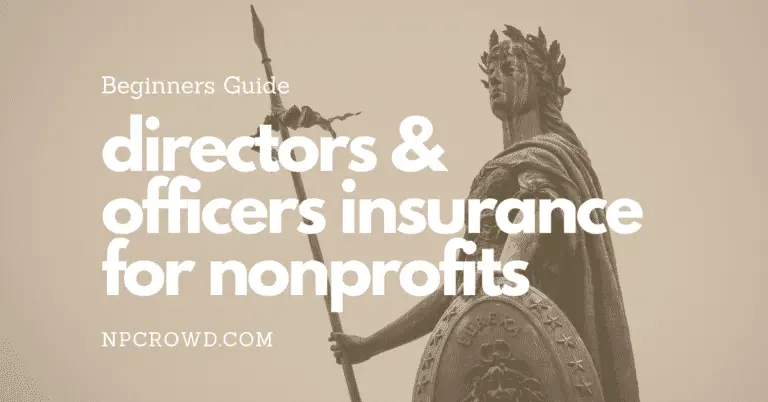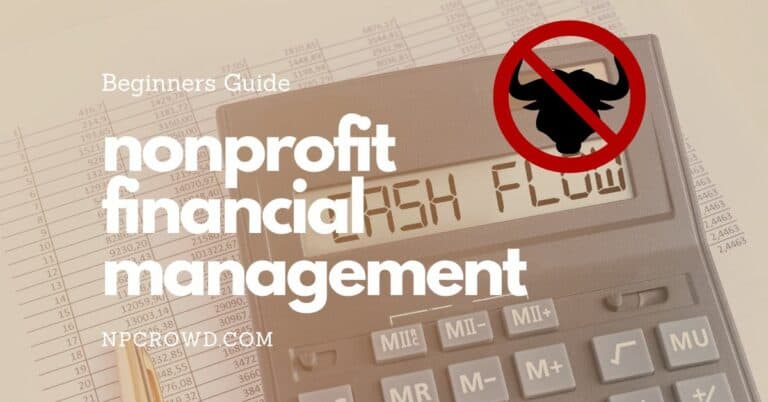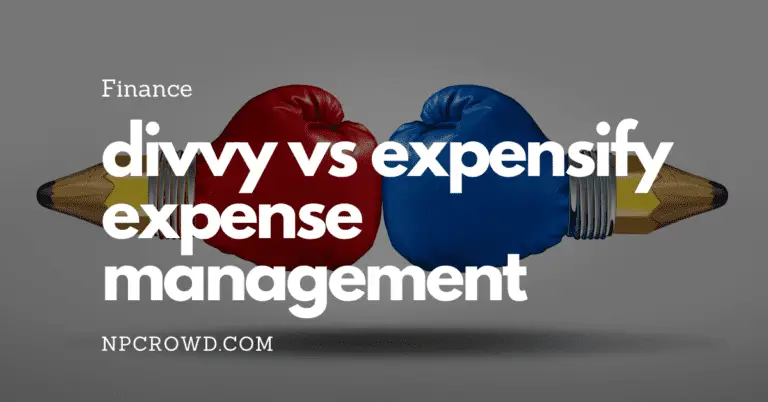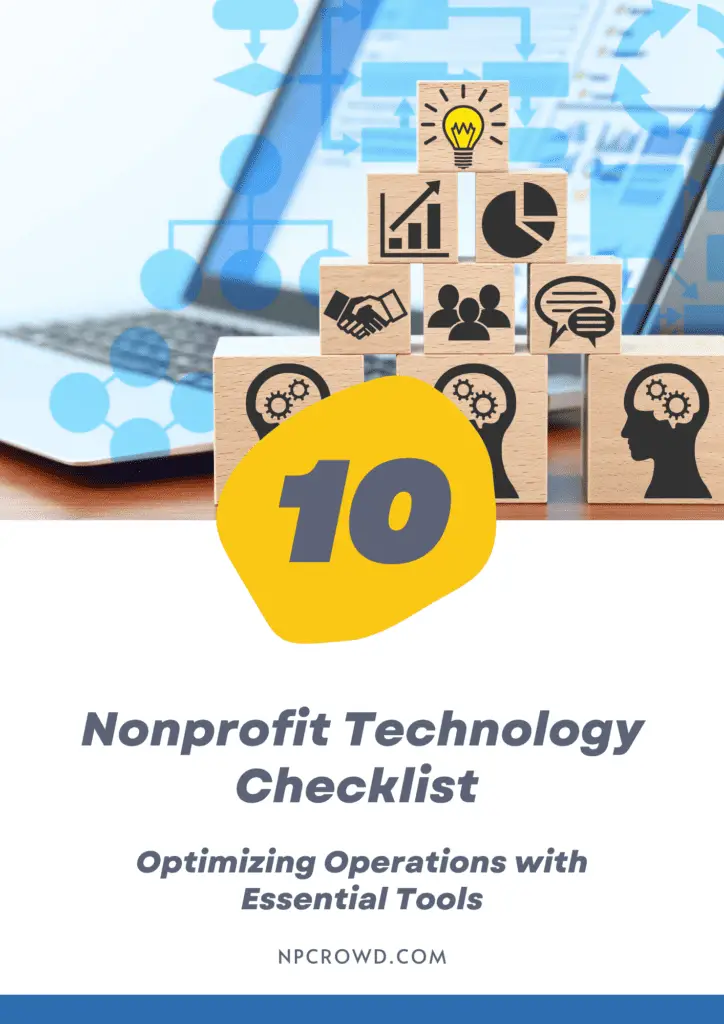Nonprofit Audits: Required or Optional – A Guide
Disclaimer: This post may contain affiliate links. These links, if used and purchases made, we may earn a small commission. These affiliate programs do not impact the recommendations we make or the resources we refer you to. Our focus is on providing you the best resources for your nonprofit journey.
We’ve all heard of audits. But we may be thinking of very different things. In this article, we are not talking about IRS tax audits, but rather independent financial audits.We’ll answer the question of whether audits are required or optional and then understand how much audits cost, how long they take, and why you might want to pay for an audit even if it is not required.
Let’s dig in…
Disclaimer: NPCrowd, nor its owners, authors, or related persons do not dispense professional advice including legal, accounting, tax, or other such guidance. To understand any requirements for your nonprofit or business, seek professional expertise from an appropriately credentialed individual or firm.
Are Nonprofit Audits Required or Optional?
As a whole, only nonprofits expending more than $750,000 in federal funding in a year, operating under a state government contract, or operating in one of 29 States are required to have independent audits if they meet certain conditions. Otherwise, nonprofit audits are likely optional. However, many foundations, government grants, and large donors may require audited financials as a part of their giving consideration process.
Now, that’s the concise general answer. You should always seek specific answers for your organization from a qualified professional.
As a 501(c)(3) organization, your nonprofit may be required to have an annual financial audit if it meets any of the following criteria:
- Annual expenditure of federal government funding is more than $750,000 (Single Audit)
- Operates with funding from a state government contract
- Operates in a state requiring audited financials
If your nonprofit does not meet any of the criteria above, an audit is likely not required unless your state has different criteria. However, you may still choose to have one conducted on a voluntary basis.
The states that currently do not have a nonprofit audit requirement are:
- Alabama
- Arizona
- Colorado
- Delaware
- Idaho
- Iowa
- Kentucky
- Missouri
- Montana
- Nebraska
- Nevada
- North Dakota
- Ohio
- Oklahoma
- Oregon
- South Carolina
- South Dakota
- Texas
- Utah
- Vermont
- Wyoming
All other states have some requirements specific to nonprofit audits.
You might also review the National Council of Nonprofits which has a lengthy state-by-state list.
What is the purpose of a nonprofit audit?
In general, there are four main purposes of a nonprofit audit:
- To ensure compliance with laws and regulations
- To provide reasonable assurance that the financial statements are free of material misstatement
- To assess the effectiveness of internal controls
- To provide constructive recommendations for improving the organization’s operations
Let’s look at each of these purposes briefly.
Ensure compliance with laws and regulations
The nonprofit audit is the best way to ensure compliance with laws and regulations that govern nonprofits. This is because the auditor will examine transactions and activities to ensure they are in compliance with these laws and Generally Accepted Accounting Principals (GAAP) rules.
If the auditor finds any non-compliant transactions, they may be reported to the board of directors as findings of the audit.
Financial statements are free of material misstatement
The main purpose of the nonprofit audit is to provide reasonable assurance that the financial statements are free of material misstatement.
This means that the auditor will examine the financial statements and check for any errors or omissions. They may also review key risks to revenues or expenses.
If any errors or omissions are found, the auditor will report them to the board of directors.
At the same time, many large donors, foundations, or other sources of funds may request or require audited financial statements. These statements help them have confidence in the reported financial health of the organization.
Effectiveness of internal controls
Another purpose of the nonprofit audit is to assess the effectiveness of internal controls. This means that the auditor will examine the procedures and controls that the nonprofit has in place to prevent and detect errors and fraud.
If the auditor finds any weaknesses in the internal controls, they will report them to the board of directors.
One example of a weakness would be a lack of segregation of duties for bill payments if one person receives the bill, enters the bill for payment, and approves the payment. There is a lack of segregation in those duties and a recommendation to improve this would be reported.
Recommendations for improving the organization’s operations
Lastly, an often overlooked benefit of the nonprofit audit is that it can provide constructive recommendations for improving the organization’s operations.
This is because the auditor will have a comprehensive understanding of the nonprofit’s operations and can offer suggestions on how to improve them. These suggestions can be anything from improving financial controls to increasing fundraising efforts.
Another example might be a recommendation to add a particular policy or improve an expense reimbursement process.
What is the Audit Process for a Nonprofit?
The audit process for a nonprofit organization is similar to the audit process for a for-profit organization. These steps include information gathering, testing of records and transactions, and then the rendering of an opinion.
The auditor will first gather information about the organization and its financial practices. This will include financial controls and policies the organization has adopted.
During the audit, the auditor will request to speak to the management representative and selected staff or board members. These interviews help gauge understanding of processes, controls, and significant financially relevant activities.
The auditor will then perform tests of the organization’s financial records and transactions. You will receive requests from the auditor to provide the backing documentation, approvals, receipts, etc… for specific transactions they have selected.
Based on the results of these tests, the auditor will give an opinion on the organization’s financial statements.
Are Nonprofit Audits Public Record?
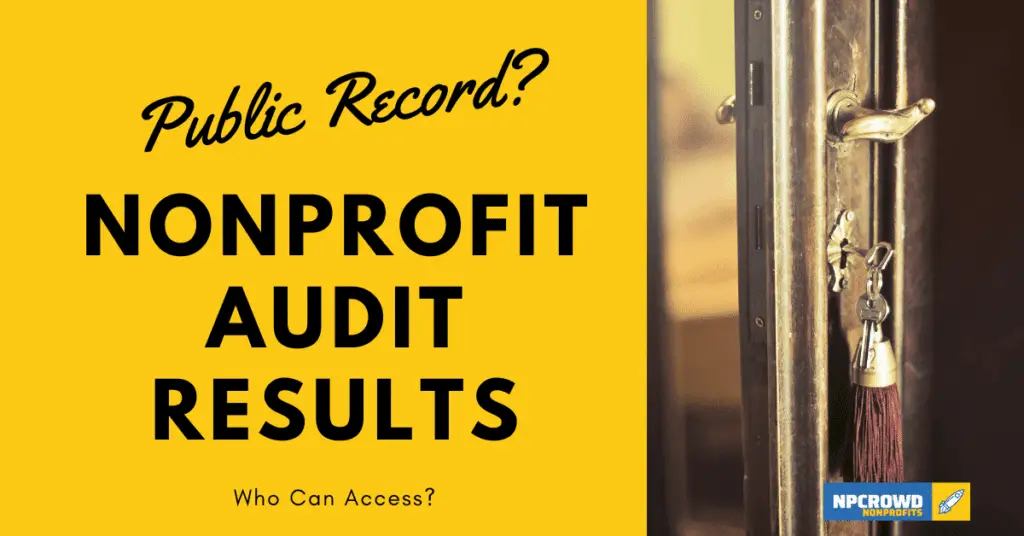
One common misconception about nonprofits is that they are not required to disclose their financial information to the public. In fact, nonprofits are required to disclose their financial information to the public in a number of ways.
First, all nonprofits are required to file an annual return with the IRS. This return, called Form 990, is a public document that is available for anyone to view. The Form 990 provides detailed information about a nonprofit’s finances, including income, expenses, and assets.
Second, nonprofits are required to make their application for tax exemption with the IRS, Form 1023, available upon request.
On the other hand, nonprofit audits are not themselves public records in most cases and therefore are not required to be shared with the public.
However, to achieve certain certifications or seals of transparency, a nonprofit may be required to make audited financials available on its website along with current and previous year’s Form 990 filings.
Examples of such evaluations requiring this level of transparency are Candid’s (formerly Guidestar) Gold Seal of Transparency, Charity Navigator, Charity Watch, and ECFA.
ExemptPay generates IRS-defensible executive compensation analysis from 5M+ Form 990 salary records — including a rebuttable presumption checklist and peer benchmarks that auditors expect to see. Explore free →
How Much Does a Nonprofit Audit Cost?
The cost of a nonprofit audit varies depending on the size and complexity of your organization. Generally, nonprofit financial audits can range from $2,000 to $50,000+ depending on a range of elements. Most audits will be completed in 6-12 weeks.
Here is some estimation of the order of magnitude cost of an audit based on the nonprofit organization’s financial size.
| Nonprofit Financial Size | Estimated Audit Costs |
|---|---|
| <$500,000 | $1,200 – $4,000 |
| $500,000 – $1,000,000 | $4,000 – $10,000 |
| $1,000,000 – $5,000,000 | $10,000 – $18,000 |
| $5,000,000 – $10,000,000 | $18,000 – $25,000 |
How Long Does a Nonprofit Audit Take?
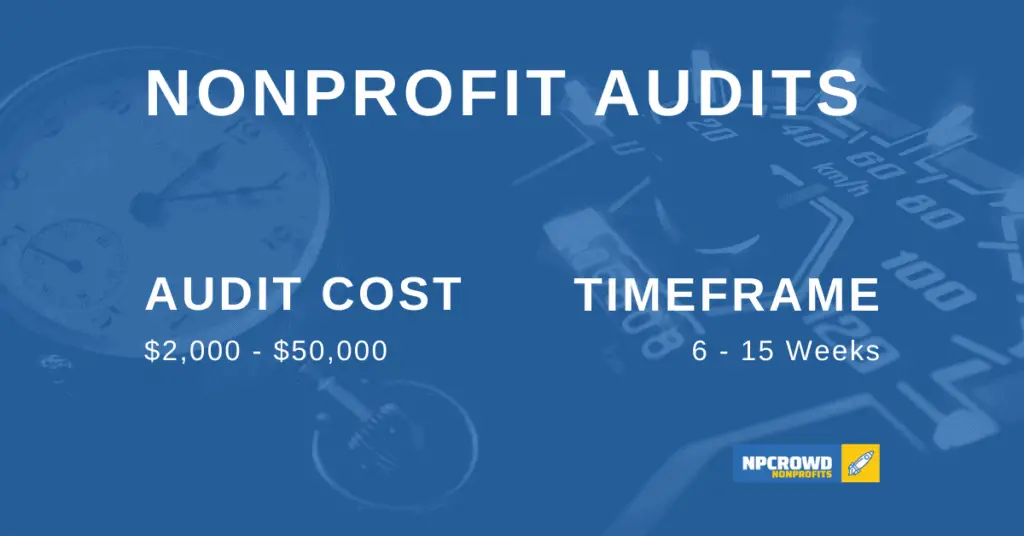
As a whole, the audit process takes approximately, 8-15 weeks depending on the size and complexity of the organization. Compressed timeframes could achieve audit completion in as short as 4-6 weeks. Also, allow for pre-audit time to begin gathering the required documentation prior to the start of the audit which will help reduce the time needed to complete the audit.
A very typical nonprofit audit timeline might look like this:
| Audit Stage | Length of Stage (Weeks) | Cumulative Audit Time (Weeks) |
|---|---|---|
| Pre-Audit Checklist | 4 Weeks | 0 Weeks |
| Field Work (Virtual) | 1-2 Weeks | 2 Weeks |
| Auditing | 4-10 Weeks | 6-12 Weeks |
| Draft Presentation | 1-2 Weeks | 7-14 Weeks |
| Final Audit Report | 1 Week | 8-15 Weeks |
What factors affect the cost and time of an audit engagement?
The size of the organization and the complexity of its financial transactions are the primary factors that affect the cost and time of an audit engagement. Other factors include the number of locations, the number of employees, the number of funders, the number of volunteers, and the geographic dispersion of the organization’s operations.
The time required to complete an audit also depends on the availability of key personnel, the quality of the organization’s accounting records, and the extent to which the organization’s internal controls are effective. In addition, the auditor’s understanding of the organization’s industry and the regulatory environment in which it operates affects the time required to complete the audit.
The factors that affect the cost and time of a nonprofit audit are:
- Organization size
- Organization complexity
- Number of locations
- Number of employees
- Number of donors (quantity of donations)
- Number of volunteers
- Number of programs offered
- Geographic dispersion of operations
- Key personnel availability
- Accounting records quality
- Effectiveness of internal controls
- Auditor’s familiarity with the nonprofit space
How Often Should a Nonprofit Have an Audit?
There is no set timeframe for how often a nonprofit should have an audit if not required by law or contract. However, most organizations choose to have a financial audit conducted every year once they reach a point of needing one.
As a general rule, nonprofits should consider independent audits annually when any of the following circumstances are true:
- Expenses exceed $500,000 annually
- More than 5,000 donors
- More than 10 paid employees
When should a nonprofit start having audits?
Many nonprofits are not required to have an audit. However, there are certain circumstances where an audit may still be required, such as if the nonprofit is:
- Applying for government funding
- Seeking a loan from a financial institution
- Receiving a large donation from an individual or foundation
- Working with a for-profit partner
If your nonprofit is not required to have an audit, you may still choose to have one conducted on a voluntary basis.
An audit can provide valuable insights into your nonprofit’s financial health and help to identify any areas of weakness or governance needs in order to reduce the risk of potential fraud.
Who Audits Nonprofit Organizations?
There are a few different types of audits that a nonprofit organization can go through. The most common type of audit is the financial statement audit, which is conducted by an independent certified public accountant (CPA). This type of audit is required for nonprofits that receive government funding, and it is also recommended for nonprofits that want to maintain good financial practices.
This article is focused on the financial audit, but it is important to understand other types of audits that nonprofits may undergo including internal audits, compliance audits, and program audits.
Internal audits are conducted by the organization’s own staff and are used to assess the organization’s internal controls and procedures.
Compliance audits are conducted by government agencies or third-party organizations to ensure that the nonprofit is complying with all applicable laws and regulations.
Program audits are conducted by staff or consultants but can also be conducted by donors or grantors to assess the effectiveness of the program being funded.
Financial Review vs Audit

There are two types of financial reporting that nonprofits must adhere to, the financial review and the financial audit.
A financial review is a less intensive form of financial reporting that is typically conducted by an independent accountant. It differs from an audit in several ways:
- A financial review does not review items as deeply as an audit
- A financial review is limited to the accuracy of the financial statements
- A financial review does not investigate or review internal controls and processes
- A financial review does not constitute a “professional opinion” about the financial statements
- A financial review is less expensive and time-consuming than an audit
On the other hand, an audit is a more intensive form of financial reporting that is conducted by an independent accountant. Audits differ from financial reviews in several ways:
- Audits require a deeper level of documentation, review, and analysis than a financial review
- Audits include a review of financials, accounts, transactions, GAAP compliance, controls, policies, and processes.
- Audits are more expensive and time-consuming than financial reviews
- Audits may include operational efficiency recommendations
So, which one is right for your nonprofit? If you are required to have an audit, then you will need to budget for the additional cost and time. However, if you are not required to have an audit and simply need an independent review of your financials, a financial review may be a more cost-effective option.
Final Thoughts
Nonprofit audits are an important part of ensuring that your organization is operating efficiently and effectively. Although they can be costly and time-consuming, they are typically worth the investment once you reach a certain size.
Audits can also be helpful in identifying areas where your organization can improve its financial practices. Increasing donor trust in the financial health of your nonprofit can be achieved by making audited financials available upon request or on your website along with your Form 990 returns.
Compensation questions coming up? Be ready.
Whether it is a board review, a new hire, an audit, or someone browsing your 990 – ExemptPay helps you respond with data. Explore free salary benchmarks from 3M+ Form 990 records, then generate a Board Confidence Report with peer group analysis and minutes-ready language your board can act on.

